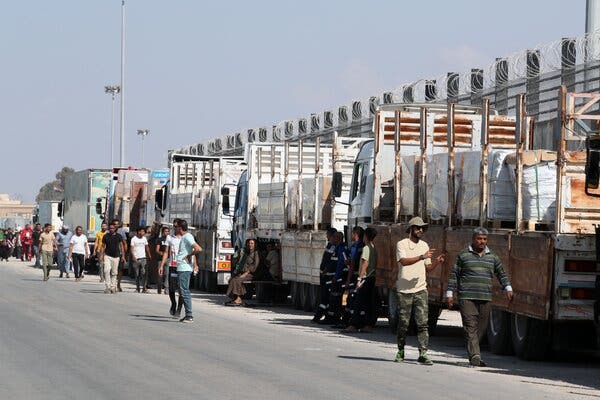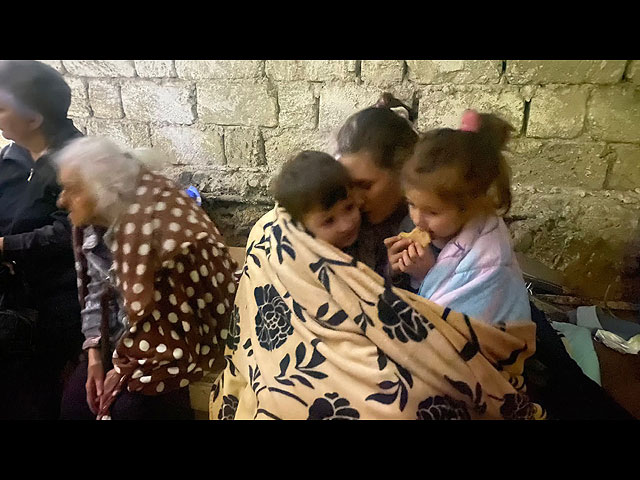The Humanitarian Crisis In Gaza: Blockade's Impact On Food Security And Public Health

Table of Contents
Food Insecurity in Gaza: A Consequence of the Blockade
The blockade's impact on food security in Gaza is undeniable. Years of restricted access to essential resources have created a cycle of poverty and malnutrition, threatening the very survival of the population.
Restricted Access to Essential Food Supplies
The blockade severely restricts the import of essential food items, leading to chronic shortages and drastically inflated prices. This makes nutritious food unaffordable for many families.
- Limited agricultural land: The scarcity of arable land restricts local food production, increasing reliance on imports.
- Restrictions on fishing zones: Restrictions on fishing zones limit access to a vital protein source for many Gazans.
- Dependence on imported food: Gaza is heavily reliant on imported food, making it exceptionally vulnerable to price fluctuations and supply disruptions caused by the blockade.
- High import costs: The costs associated with importing food are significantly high due to the blockade, further straining already limited resources.
- Difficulty in accessing international aid: Even when international aid arrives, its distribution can be hampered by bureaucratic hurdles and logistical challenges imposed by the blockade.
Malnutrition and its Devastating Effects
Food insecurity has led to widespread malnutrition, particularly among vulnerable groups such as children and pregnant women. The long-term effects are devastating.
- Increased rates of stunting and wasting: Malnutrition causes stunted growth and wasting, leading to physical and developmental delays in children.
- Impaired cognitive development: Malnutrition negatively affects brain development, resulting in impaired cognitive function and reduced learning capabilities.
- Weakened immune systems: Nutritional deficiencies weaken the immune system, increasing susceptibility to infectious diseases.
- Increased susceptibility to disease: Malnourished individuals are more vulnerable to a wide range of diseases, increasing mortality rates.
Impact on Agricultural Production
The blockade has crippled local agricultural production, further exacerbating the food crisis. Farmers face numerous obstacles in producing enough food to meet the needs of the population.
- Restricted access to seeds and fertilizers: Restrictions on the import of seeds and fertilizers limit crop yields and agricultural productivity.
- Damage to agricultural infrastructure: Conflicts and the blockade have damaged vital agricultural infrastructure, hindering production and distribution.
- Limited export opportunities: The blockade restricts export opportunities, limiting the income of farmers and reducing their capacity to invest in their farms.
- Depletion of water resources: Over-extraction of water resources due to population pressure and lack of investment in water management further strains agricultural production.
Public Health Crisis in Gaza: A Direct Result of the Blockade
The blockade's impact extends far beyond food security; it has triggered a devastating public health crisis. The already strained healthcare system is struggling to cope with the overwhelming needs of the population.
Strained Healthcare System
The blockade has severely weakened Gaza's healthcare system, making it increasingly difficult to provide adequate medical care.
- Shortage of essential medicines and medical equipment: The blockade restricts the import of vital medicines and medical equipment, leading to shortages and limiting the effectiveness of healthcare services.
- Power shortages affecting hospitals: Frequent power outages disrupt hospital operations, jeopardizing patient care and the preservation of essential medical supplies.
- Lack of trained medical personnel: The brain drain of skilled medical professionals seeking better opportunities elsewhere further weakens the healthcare system.
- Limited access to specialized care: Access to specialized medical care is severely limited due to the blockade, forcing many patients to seek treatment outside Gaza, often at great personal cost.
High Prevalence of Infectious Diseases
Poor sanitation, limited access to clean water, and overcrowded living conditions contribute to the high prevalence of infectious diseases.
- Waterborne diseases (cholera, typhoid): Contaminated water sources lead to outbreaks of waterborne diseases, posing a significant threat to public health.
- Respiratory infections: Overcrowded living conditions and poor air quality increase the risk of respiratory infections, particularly among children and the elderly.
- Increased risk of outbreaks: The weakened healthcare system increases the risk of widespread disease outbreaks that the system is ill-equipped to handle.
Mental Health Impacts
The ongoing blockade and its devastating consequences have had a profound and lasting impact on the mental health of the Gazan population.
- Increased rates of depression and anxiety: The constant stress, uncertainty, and hardship associated with the blockade contribute to high rates of depression and anxiety.
- PTSD: The experience of repeated conflicts and trauma has led to widespread Post-Traumatic Stress Disorder (PTSD).
- Lack of access to mental health services: The already limited mental health services are further strained by the blockade, leaving many individuals without access to necessary care.
International Response and the Need for Urgent Action
While humanitarian aid is provided, it is often insufficient to address the scale of the Gaza humanitarian crisis. A multifaceted and sustained international response is urgently required.
Insufficient Humanitarian Aid
Despite efforts from humanitarian organizations, funding gaps and logistical challenges hamper effective aid delivery.
- Funding gaps: The amount of humanitarian aid provided frequently falls short of the actual needs of the population.
- Restrictions on aid delivery: The blockade itself imposes restrictions on the delivery of aid, delaying its arrival and reducing its effectiveness.
- Logistical challenges: The complex political and security situation in Gaza presents significant logistical challenges for aid delivery.
Advocating for an End to the Blockade
International pressure is crucial to lift the blockade and facilitate the free flow of essential goods and humanitarian aid.
- Role of international organizations: International organizations play a critical role in advocating for an end to the blockade and providing humanitarian assistance.
- Diplomatic efforts: Sustained diplomatic efforts are needed to negotiate an end to the blockade and secure a lasting peace.
- Public awareness campaigns: Raising public awareness about the severity of the Gaza humanitarian crisis is essential to garner international support for action.
Long-Term Solutions for Sustainable Development
Sustainable solutions necessitate addressing the underlying causes of the crisis and fostering long-term economic development in Gaza.
- Investing in infrastructure: Investment in critical infrastructure, including water, sanitation, and energy, is essential for improving living conditions.
- Supporting local businesses: Supporting local businesses and creating job opportunities are crucial for stimulating economic growth and reducing poverty.
- Promoting education and job creation: Investing in education and skills development will empower Gazans and enable them to contribute to the economic development of the region.
Conclusion
The ongoing blockade of Gaza has created a catastrophic Gaza humanitarian crisis, with severe and far-reaching consequences for food security and public health. The resulting widespread malnutrition, disease, and a crippled healthcare system demand immediate and sustained action. Addressing this crisis requires a multifaceted approach, including an immediate end to the blockade, a significant increase in effective humanitarian aid, and a long-term commitment to sustainable development in Gaza. We must act now to alleviate the suffering of the Gazan people and prevent further deterioration of this devastating situation. Let us all work together to end this devastating Gaza humanitarian crisis and build a future where the people of Gaza can live with dignity and security. Learn more and get involved by supporting organizations working to provide aid and advocate for an end to the blockade.

Featured Posts
-
 Dijon 2500 M Dedies A Une Nouvelle Plantation De Vignes Aux Valendons
May 10, 2025
Dijon 2500 M Dedies A Une Nouvelle Plantation De Vignes Aux Valendons
May 10, 2025 -
 Is Jeanine Pirro Right Should You Ignore The Stock Market Now
May 10, 2025
Is Jeanine Pirro Right Should You Ignore The Stock Market Now
May 10, 2025 -
 S Sh A I Noviy Potok Bezhentsev Iz Ukrainy Obespokoennost Germanii
May 10, 2025
S Sh A I Noviy Potok Bezhentsev Iz Ukrainy Obespokoennost Germanii
May 10, 2025 -
 A New Look For A Legend Inside The Renovated Queen Elizabeth 2 2 000 Guests
May 10, 2025
A New Look For A Legend Inside The Renovated Queen Elizabeth 2 2 000 Guests
May 10, 2025 -
 The New Android Design A Gen Z Perspective
May 10, 2025
The New Android Design A Gen Z Perspective
May 10, 2025
